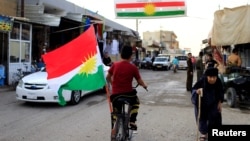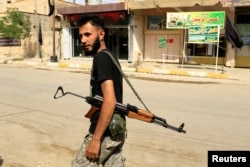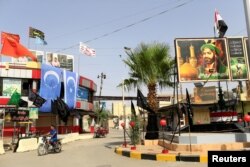On the eve of the historic referendum on independence, Kurds across the region were celebrating. Young people honked their horns and shot celebratory gunfire into the air of major cities.
But not in Tuz Khurmatu, an Iraqi town of more than 100,000 that is violently split among Kurds and Shi'ite Turkmen, who oppose Monday's referendum.
"I hope the referendum will be canceled," said Luay, a Turkman shopkeeper in Tuz. "If they don't, the Kurds will take over by force and there won't be any Turkmen or Arabs left."
The town is part of the disputed territories, ethnically mixed areas in northern Iraq claimed by both the central government in Baghdad and the autonomous Kurdish government in the north. Each side has tried to consolidate their power over the town since the U.S.-led invasion of Iraq in 2003.
Kurdish officials have insisted throughout the referendum campaign that all residents of the disputed territories — including Kurds, Arabs, Turkmen and other minorities — would be allowed to vote.
However, by Sunday afternoon, the ballot boxes had yet to be distributed throughout the rundown town, which local Kurdish officials attributed to a lack of security forces able to help deploy them safely.
Plans had been made to have polling stations in all neighborhoods, said Arslan Ali, a local representative of Barzani's Kurdistan Democratic Party (KDP), which has been pushing for the referendum.
"We will make it happen," Ali said.
This was unlikely, since Tuz Khurmatu is unmistakably split: while Kurdish Peshmerga forces control a Kurdish half, Iran-backed Shi'ite paramilitary groups (PMF) control the Turkmen neighborhoods.
"We will not let them approach the Turkmen areas," said Mohammed Mahdi al-Bayati, a senior leader in the Badr Organization, the preeminent PMF force in the area. "They want to seize the disputed territories, but we will not let them."
A decision by Kurdish President Massoud Barzani to include these ethnically mixed areas in the plebiscite was widely interpreted as a unilateral move to consolidate Kurdish control.
When Islamic State militants overran about one third of Iraq in 2014, the Kurds seized the moment and took over vast areas in northern Iraq, left vulnerable by a fleeing Iraqi army.
Peshmerga fighters moved deeper into the disputed territories, including Tuz Khurmatu, which they defended against the militants.
But this ignited the Shi'ite Turkmen's fears of being subjected to Kurdish rule. Though PMF-led Turkmen worked together to push Islamic State militants out of Tuz Khurmatu, ultimately the fragile coalition fell apart and led to open hostilities.
"The referendum will be the start of a crisis in the disputed territories," al-Bayati said, at a his organization's base in Tuz Khurmatu, where it has been based since 2014.
Asked whether his forces would move to prevent such a crisis, al-Bayati made only veiled reference to looming violence: "There will be conflict for sure within 24 hours of the referendum."
Memories of Mixed Neighborhood
Walking through the Turkmen neighborhood of Aksu, solid-black flags flutter alongside banners with Shi'ite iconography, a reminder of the somber month of Muharram.
The area used to house the main market, where both ethnic groups used to trade. It is now encased in blast walls and guarded by PMF fighters. According to Turkmen residents and shopkeepers, Kurdish shops and houses were burned down, forcing Kurds to move out.
"I used to like that it was mixed neighborhood," said Luay, the Turkman shopkeeper. "But then the Kurds killed my brother on this street."
A five-minute drive away is the rival Kurdish market, where tri-color Kurdish flags were flying high. It was established by Kurds afraid of the old market.
"I used to have lots of Turkmen and Arab friends," said Shalaw, a Kurdish toyshop owner. "Many of the Turkmen have since joined [the PMF], and I'm afraid to cross the city border to go and see them. I'll be killed."
Like other Kurds interviewed in the market in al-Jumhuriyah, Shalaw lamented Tuz Khurmatu's split, which he blamed on the PM's arrival. But he said he will vote for independence on Monday.
Badr leader Al-Bayati cynically said the referendum suited his group's interests.
"Iraq is against the Kurds, so are the Turks, the Iranians, the whole Arab region and Europe. They are going to live in a cage."







